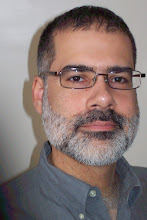I've been reading Osho's commentary recently of the Bloodstream Sermon, a Buddhist sutra attributed to Bodhidharma. One thing is certainly clear; Osho doesn't mind saying what's on his mind, nor does he pull verbal punches. At first, I didn't almost stopped reading it before I had even fully started, because Osho attributed India's poverty and caste system to Siddartha Buddha, saying that his admonition to suffer injustice has led to people in India just sitting back and taking it. Which seems, aside from harsh, pretty unjustified, as India is mostly a Hindu, not a Buddhist, nation.
I'm glad I persevered though, because I'm finding it an enlightening read, although I haven't achieved enlightenment. If there's one thing Osho is good at, it's parsing out what was most likely to have been said by Bodhidharma, and what is a mistake by the person or persons who actually wrote the Sermon.
Because, as Osho points out, Bodhidharma of a certainty did not write the Bloodstream Sermon. No enlightened person ever wrote anything anywhere at any time. They spoke their words to wake up the people near them, and that was it. Think about it; Jesus didn't write any part of the gospels, Rumi didn't write any of the works attributed to him (his secretary and aide, by his own admission, wrote as fast as he possibly could while Rumi recited), Siddartha didn't write any of the sutras attributed to him. The disciples remember, and wanting to preserve something of their beloved masters, they wrote down what they remember hearing.
At once, these disciples do a service and a disservice to their masters and to the world at large. A service because we have some inkling, an echo, of what all these buddhas left to us, and a disservice because co-mingled in amongst the works are the words of the disciples, rather than the masters. This is why there can be dissonance even within traditions and is the source of schisms.
One example from the Bloodstream Sermon Osho points out is the use of the word, "mind." Throughout the text of the sermon, Bodhidharma is quoted as saying that the mind is important. That buddhas transmit mind to mind. That the mind is the Buddha, and the Buddha is the mind. However, the mind is one of the six senses in Buddhist psychology and phenomenology. The mind can't be the source of buddhas, because as part of the six-fold sense base, it's wrapped up in the world as much as they other senses. Mind is something to be transcended, to leave behind, in the quest for enlightenment. What one really has to apprehend is his no-mind, the clear awareness behind the mind, which the mind and its concomitant ego cover up. This is borne out in the Heart of Wisdom sutra, where it states, "...the mind is no hindrance. Without hindrance no fear exists."
How much of any tradition, one wonders, is polluted by the writings of well-meaning but nonetheless deluded disciples, all of whom not only love their masters, but also have ideas in their minds (rather than no-minds) about what those masters are about? How much of Christian love, for example, has been turned into hatred because of over-reliance on words that Jesus never spoke?
In a lovely essay on the Way, Ananda Maitreya talks about a horrible forest where people are trapped. A wayfarer plots his way out of the forest, and he leaves behind a signpost for others to follow him on the way out. However, after a time, an entire community has sprung up around the signpost, with many hundreds of people worshiping the post, writing doctrine about it, theories about it, about what it means, heaping offerings upon it; everything except what they should be doing, which is following it out of the forest!
The lesson in reading Osho's commentary on the Sermon and other things is finally this: don't be fooled by the written word, and be sure to carefully parse the true meaning. More importantly, don't waste too much time studying the words of others. Wake up yourself, and see the suchness both of yourself, and of the world itself. Everything will be luminous in a way it never was before.
Subscribe to:
Post Comments (Atom)

This from a well read man commenting on writing. An imperfect tool incapable of portraying Truth if such a thing is even comprehensible to we uber roaches but still the best tool we have. Why should the spoken word be more enlightening? True, it contains elements such as inflection, tone, volume and other subtle signals that can fill out meaning but are also more apt to be misinterpreted or more likely misremembered.
ReplyDeleteLincoln was a Buddha! His Gettysburg Address summed up more truth about the nature of this country and its ideals than all the other documents put together. Tom Paine in his first Crisis pamphlet was unsparing and ultimately inspiring in his explanation of what true courage is.
These are temporal matters and not metaphysical. They reek of the Earth and life as we know it or wish it. Still, they liberated human beings not from their delusions but at least from each other. And that is no small thing.
Outside the National Archives, engraved in stone, my favorite writer's saying: The Written Word Endures. What chance you would have to become enlightened if you never even heard of the Buddha and his ideas? Why do you read about him?